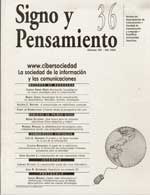Abstract
Según el autor, la mayoría de los discursos actuales sobre la sociedad de la información parten de un determinismo técnico que presupone que toda solución a un problema social reside en el progreso tecnológico y en el desarrollo de las redes. Se explora las nociones de red y comunicación. Según el autor, la empresa y la comunicación se han convertido en los dos conceptos fundamentales sobre los cuales se pretende concebir la nueva racionalidad de la organización social. El autor realiza una crítica a los fundamentos de la sociedad de la información en la medida en que las utopías del discurso tecnologicista se fundamenta en un alejamiento de lo político. Se presentan datos acerca de la desigualdad informativa a nivel mundial. Se realiza una crítica a la industrialización de la Universidad contemporánea y se analiza la incidencia de las tecnologías en la educación, el aprendizaje y la transmisión de la cultura.This journal is registered under a Creative Commons Attribution 4.0 International Public License. Thus, this work may be reproduced, distributed, and publicly shared in digital format, as long as the names of the authors and Pontificia Universidad Javeriana are acknowledged. Others are allowed to quote, adapt, transform, auto-archive, republish, and create based on this material, for any purpose (even commercial ones), provided the authorship is duly acknowledged, a link to the original work is provided, and it is specified if changes have been made. Pontificia Universidad Javeriana does not hold the rights of published works and the authors are solely responsible for the contents of their works; they keep the moral, intellectual, privacy, and publicity rights.
Approving the intervention of the work (review, copy-editing, translation, layout) and the following outreach, are granted through an use license and not through an assignment of rights. This means the journal and Pontificia Universidad Javeriana cannot be held responsible for any ethical malpractice by the authors. As a consequence of the protection granted by the use license, the journal is not required to publish recantations or modify information already published, unless the errata stems from the editorial management process. Publishing contents in this journal does not generate royalties for contributors.


